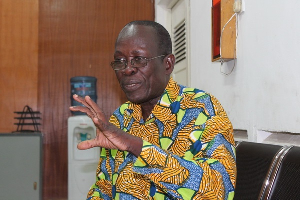The Secretary General of the Ghana Federation of Labour (GFL), Abraham Koomson has emphasized that high cement prices and other expensive goods are symptoms of deeper economic problems.
He expressed concerns over a new legislative instrument (L.I.) aimed at regulating cement prices in Ghana and warned that it would endanger industrial growth and hamper investor confidence.
Abraham Koomson believes that if not handled carefully, the price control measure could harm businesses and have unintended consequences for the economy.
During an interaction with the media in Tema, the GFL Secretary General criticized the government for failing to address the structural issues plaguing the economy, stating, "Those in power seem clueless about fixing them."
Instead of relying solely on regulations, Abraham Koomson suggested that the Ministry of Trade and Industry engage in thorough consultations with stakeholders to negotiate cheaper prices.
He urged the Trade and Industry Minister, Kobina Tahir Hammond, and cement producers to meet and discuss their concerns about the L.I.
Koomson's concerns come after K. T. Hammond allegedly rejected a petition from the Chamber of Cement Manufacturers to delay the implementation of the law.
The minister argued that the legislation is necessary to prevent manufacturers from forming a price-fixing cartel.
However, Koomson warned that the strict measures proposed in the law, including imprisonment for up to three years for violating price regulations, could have negative effects on the economy.
The caution by the GFL echoes the concerns of many in the business community who fear that price regulation could lead to unintended consequences, such as shortages, black markets, and reduced investment in the industry.
The cement price regulation debate highlights the broader challenges facing Ghana's economy, including high inflation, currency fluctuations, and a large trade deficit.
As the government seeks to address these issues, it must balance the need to protect consumers with the need to support businesses and promote economic growth.
MA/NOQ
Business News of Wednesday, 10 July 2024
Source: www.ghanaweb.com

















